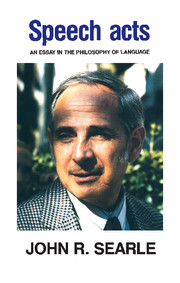Summary
In this chapter we shall attempt to complete our characterization of the illocutionary act by giving an analysis of the propositional act of predication. Predication, like reference, is an ancient (and difficult) topic in philosophy, and before attempting to give a speech act analysis of predication I shall consider certain well known theories of predication and the problems of “ontological commitment” with which they are related. I begin with Frege's account.
Frege on concept and object
In a statement made using the sentence “Sam is drunk” what if anything stands to “—is drunk” as Sam stands to “Sam”? Or is this an improper question? Frege, who assumed it was a proper question, gave the following answer. Just as “Sam” has a sense and in virtue of the sense has a referent namely Sam, so “—is drunk” has a sense and in virtue of that sense has a referent. But what is the referent of “—is drunk”? To this Frege's answer is: “a concept”. To which one's natural response would be: “which concept?” And to this the tempting answer is, “the concept drunkenness”. But clearly, as Frege sees, this answer will not do, for on that account “Sam is drunk” must be translatable or at any rate must have the same truth value as “Sam the concept drunkenness”, in accordance with a version of the axiom of identity which Frege accepts, that whenever two expressions refer to the same object one can be substituted for the other in a sentence without changing the truth value of the corresponding statement.
Information
- Type
- Chapter
- Information
- Speech ActsAn Essay in the Philosophy of Language, pp. 97 - 128Publisher: Cambridge University PressPrint publication year: 1969
